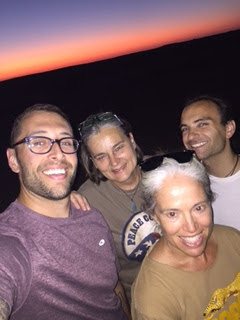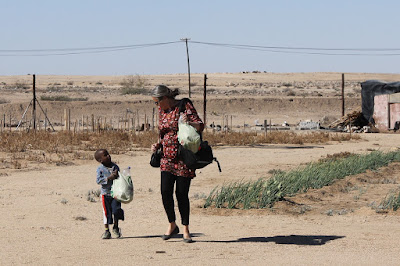Tandem skydiving in February 2016 was fun, a bit, and interesting, but not the thrilling rush, for me, that it most definitely was for the four friends who went with me, and most of the others we met that day. One man seemed just to hate it, but that wasn't my reaction. My reaction was, 'Roller coasters are more fun than this.' That response made no sense to me, so I wanted to investigate further. When we were signing up for the February go-round, I had seen the company offered skydive lessons, so I wrote and asked about that.
It took kind of a long time and a lot of back-and-forth to find out that I could do something called a 'static-line' dive with a few hours' training, and not too expensively. So I said I wanted to, and they said someone would contact me, and no one did. But when the shadows came we stayed at Amanpuri, the lodge from which the skydivers operate, and I bumped into some of them, who remembered me from February, and I told them I wanted to do the static-line, which news they greeted enthusiastically. And nothing happened.
 |
| Winged golfcart. One of the pilots sometimes wears a chute when he's flying. Hmmm. |
And then, in June, I was sitting in the bar at Amanpuri and one of the skydivers came in and said hello, and told me Frank was teaching a few prospective divers upstairs, and I could probably join them. And then I wondered if I really wanted to skydive all by myself, but y'know, so I finished my g&t and stepped up to the office.
It was very interesting to learn how the whole thing works. There's no motor (which I guess I vaguely knew), no pulleys or levers or springs. The parachute operates just with air and momentum and a few strings, ensuring a human body safe passage through the sky. The 'chute, or canopy, is packed up in a satchel or knapsack you harness to your back, and when you pull the satchel open, the air -- which is moving quite briskly as you are a big dense thing plummeting through the atmosphere's relatively-complete undense-ness (physics!) -- fills up the fabric, and you slow abruptly and float the rest of the way. Physics! Just cloth and strings and you and physics! I like that.
 |
| Lucy's canopy beginning to deflate. Mine was more colorful. |
Now, in order to pull the strings in the right order at the right time, you need to do a lot of training and a lot of practice, and you jump from 10,000 feet and freefall for a while (less than a minute, actually), and two pros go with you and make sure you don't mess it up, and you plonk down several thousand dollars and commit to hanging around Swakop going skydiving every chance you get for two or three weeks, gradually adding to your understanding of the craft and doing it over if they don't like your altimeter-checking technique and whatnot. Which is not feasible for me. But, with just a few hours of being shown a canopy, forced to shout, "Arch thousand, two thousand, three thousand, four thousand, five thousand," in the office louder than you want to, and throw your hands in the air and arch your back, etc., you can do a static-line jump from 3,000 feet.
Static line means that they attach the opening flap of your canopy pack to a leash, and the leash to a sturdy anchor inside the airplane, so when you fling yourself out of the plane, your weight pulls the leash out full length, and since it's attached to a plane and you're just a person, it stays with the plane and pulls open your pack, almost immediately on your exit, and you spend less than five arched seconds plummeting in freefall before the air catches the canopy fabric, slows you down, and allows you to waft gently groundward.
 |
| This is the basic pre-fling position. Since I didn't expect to be skydiving that day, I only had sandals, but they loaned me someone's sneakers for the jump. |
 |
| Lucy practices altimeter checking with David's oversight. |
A lovely young Englishwoman named Lucy was in class with me, and together with a trainee diving instructor we drove out to the drop zone the next morning, me thinking about how I'd planned to be grocery shopping right about now. Lucy was doing the freefall lessons, so they made her lie down in the grass and practice her arching and altimeter checking, and they strapped us both into a chute harness hanging from a jungle gym and jostled us about so we could practice emergency back-up chute releasing, and they waved ping pong paddles at us to practice landing and so forth. And then we went out to the plane. As we walked, the teacher/jumpmasters kept asking if we were okay, and ready, and my brain kept saying, "Well..." and then my face would say, "Yep," a second or two later. So I got in the plane, all kitted out, and away we flew.
 |
| Kitted. Borrowed sneakers; biggest helmet they have. |
It doesn't take that long to get to 3,000 feet, even in a tiny airplane. At 1,000 feet, I checked my helmet and many straps, working down, and David showed me that my leash was firmly attached, and made me tug it. (I am getting those weird stomach feelings as I type this, although I don't remember having them at the time. I was pretty detached.) At 3,000 feet, I skooshed over to the door, gripped its edges and stuck my feet out until I was perched up on my left buttock. Then I looked over my shoulder at David, who said, "Checking in?" which is skydiver-ese for, "You ready to fling yourself out of this plane?" and I thought for a moment and replied, "Checking in," which is skydive-trainee-ese for, "Of course not you raving lunatic how much of an idiot do you truly believe me to be, but I guess I'm going to do it anyway, as it would be pretty silly to skoosh on back now and just have a way boring, short plane ride after all this pantomime and Powerpoint." And then I took a deepish breath - there was plenty of air rushing about just outside that airplane, lemme tell ya -- and flung my right side out and started to arch.
It felt like a complete fiasco; like I'd just turned upside down and gone completely concave and was flailing my feet and arms around trying to get convex, but before I could get from embarrassment to panic, the canopy deployed without smacking a strap into my neck, and I was just moseying down gentle as you please, entirely vertical with the plane high above me. There was a little twist in the lines that attached the parachute to my harness, as expected, but they just untwisted themselves (physics!). I had to find my steering/braking cords, which are bright yellow, but the only bright yellow things were way high up and didn't look like they'd steer anything, so I was a bit nervous about that. I grasped them anyway, and they unfolded with a Velcro(R) skritch, and I steered myself, rather delighted that the whole shebang is held together with Velcro! You pull on the right cord to turn right, etc., and both cords to brake. Braking in mid-air was amazing! It felt like I had stopped floating completely, and was just dangling in the sky. And my canopy was all beautiful multi-colors, and later Frank and the trainee instructor told me I'd done just fine with my arch, and showed me video on a tablet that putatively proved this, but the me part just looked like a raisin in the ocean to me.
 |
| Lucy made her second jump at sunset. |
Sadly, I was really uncertain about how much steering I should be doing in order to land myself in the big smiley-face landing circle. The wind sock seemed to be saying I should float over the drop-zone buildings, but no way on earth should I be floating over buildings at this stage. Dumb luck, or maybe someone else's planning, got me aligned properly, and then a guy on the ground waved ping-pong paddles at me to show me which way to turn. You have to be very, very close to the ground before they tell you to 'flare,' which is braking, which is kind of nervous-making; the ground seemed very close and I seemed to be moving awfully fast before he let me try to stop. But I obeyed orders like an autopilot, and touched down a few centimeters outside the circle, light as thistledown, then unbalanced slightly backwards so I sat abruptly down. "We won't tell anyone about this part, right?" I said to paddle-guy, who might be named Bones but no one ever bothers introducing themselves here, as I stood, and he said, "You just need to flare a bit stronger."
So my second skydive was great, and I kept smiling about it -- until one of the jumpmasters, and a young German woman (she was in class the night before but couldn't dive because of her job; she came out to the drop zone because she is best friends with all the skydivers) told me that they hate all Americans. Yep, my mother and me included. They hate us because, "You act like you think you're cool." I cannot imagine why anyone would be so unkind to a near-stranger on an afternoon when she has a legitimate right to celebrate. And yes, they really seemed entirely serious, and this was not as brief a conversation as I wish I had ensured it was. Earlier, the trainee jumpmaster had told me I was "the princess of the drop zone" for the day. I like that better.
This vicious insult is so obviously so close-minded, willfully ignorant and prejudiced a commentary that I honestly still don't know how I ought to have replied. I responded by figuring I would probably not go skydiving again. Which I would have liked to have done. But there's another skydive place in town, so maybe I'll check them out. Very, very carefully.
































